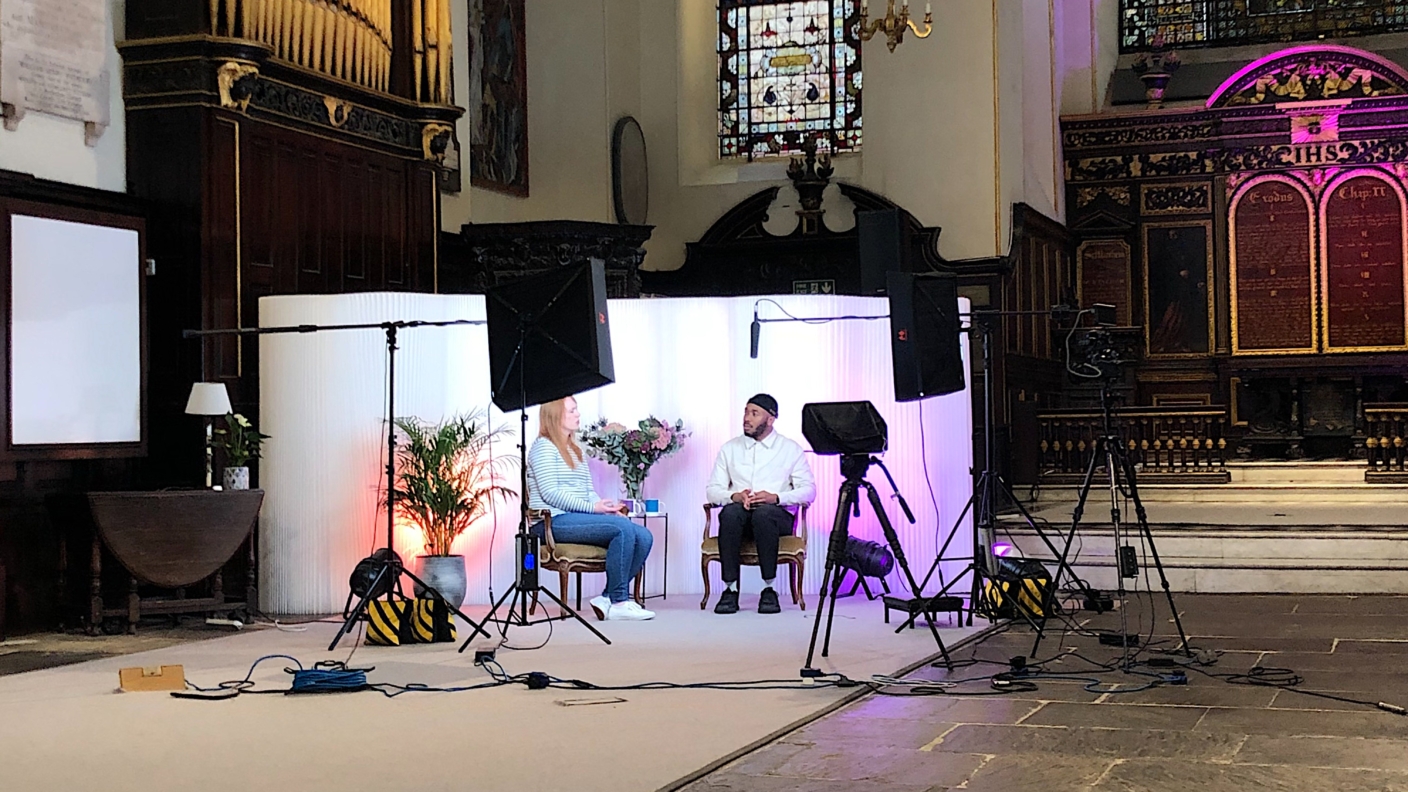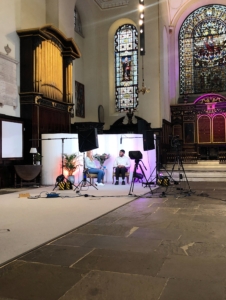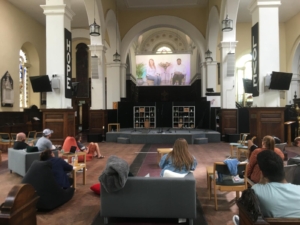Read / Feature
Multiply 2021: The highlights
Review the highlights of Multiply 2021 and discover how to catch up on all the content.

Presented by The Gregory Centre for Church Multiplication
Review the highlights of Multiply 2021 and discover how to catch up on all the content.

Presented by The Gregory Centre for Church Multiplication

In the opening session of this year’s Church Planting Conference, the founder of Messy Church, Lucy Moore, shared how the movement began out of a strong conviction that “the best way to be church is to be church together with as much diversity as we can, with as many different people coming together to walk with Jesus together and learning from and with each other.” This reflection captures the heart of this year’s conference: working together brings a richness and depth to our ministry and mission. Whether it’s different ages, church traditions, ethnicities or social demographics, we are enriched when we learn from each other and go together. As Bishop Ric summarised in his talk, “Jesus always intended that the Church should be diverse and united in its mission – different but together in its church planting.” No single church or denomination or network is enough to reach our communities with the love of God – “it is only together, shoulder to shoulder, that this mission can be achieved.”

This year, around 1400 delegates joined online on the day from across the globe to explore ways of multiplying mission and reaching new people, in different contexts and places, in different ways. We were delighted to have over 100 contributors sharing across the morning programme and the 27 live seminars in the afternoon. Speakers came from a huge diversity of church traditions, from Fr Simon Cuff sharing about the role of the Eurachrist in preparing us from mission to Bishop Emma Ineson exploring the Beatitudes as a job description for church planters and Pastor Agu Irkuwu speaking about the need to expand our thinking and break new ground. Bishop Moon Hing, who retired as the Archbishop of the Province of South East Asia and planted 50 churches while serving as a parish priest, emphasised the need to lead a planting initiative with love and compassion. Seminars explored areas such as social action and planting, inter-cultural planting, bi-vocational church leadership, making disciples in a sacramental context, building a team and leader wellbeing. All these seminars, as well as the morning main talks, can be watched today.
At last year’s conference, the Archbishop of York, Stephen Cottrell, reminded us that every church had been planted once, at some point in history, by a group of people passionate about sharing the good news of the Gospel with unreached people. This year, Archbishop Stephen expanded on this message, reminding us that church planting is at the heart of Jesus’ call to make new disciples. Reiterating that church planting and establishing new Christian communities “is nothing new”, he challenged us that “the only thing that was new is that we stopped doing it and in recent years it has been reawakened in us as absolutely central and fundamental to the commission of sharing the gospel of Jesus Christ with all people in all places… We need more ways of doing church – not fewer not less – and we need more churches.”
Later on, Bishop Ric helped us to envision this inspiring call to plant more churches as he introduced the tangible target of planting 10,000 churches over the next 10 years. Moving us from aspiration to faith-filled ambition, Bishop Ric outlined how planting 10,000 new churches with a mixed ecology could help create 1 million new disciples of Jesus Christ, leading to the transformation of lives and re-evangelisation of our nation. When we look at today’s world – our communities, our cities, our nations – we can see a world that is hurting and desperate, yet this huge need cannot be met simply by growing our existing congregations. Church growth is essential, yet Bishop Ric described how it is new churches that are often best at reaching younger generations, the unchurched, minority groups and those not usually seen in our existing churches. “We are to be a church of missionary disciples where a mixed ecology of churches is the norm… where church plants and fresh expressions compliment parish churches. It’s a movement of people who know we need to revitalise existing churches but who also go beyond the existing structures to start new churches, new pioneering ventures and new expressions of church.” The Archbishop of Canterbury echoed this call, stating, “Planting churches to scale, doing it shoulder to shoulder, doing it collaboratively, we can re-plant this country.” Prayer is to be at the foundation of this mission, echoing Jesus’ words in the Gospel of Matthew to ask the Lord of the harvest to send workers into his harvest field (Matt 9: 38). This reliance on prayer also reminds us that church planting is not ultimately about numbers, but is rooted in the deep conviction that meeting Jesus is the best thing that can happen to any individual. Bishop Ric ended with the challenge, “What if every church took time to pray, to plan and to plant, and do it again?”
 Joy French’s moving testimony also spoke about our longing to see God break in and bring transformation to our communities. Joy is the Oversight Minister at St John’s Owlerton in Sheffield, a church with a strong emphasis on social action, and she reminded us that God’s work doesn’t always look the way we’d like it to or expect as we reach out to a broken and messy world. If we are working alongside people whose spirits have been brought low and crushed by life, our gatherings might feel more messy and meet our needs less, and our measurements of what makes a successful church plant might be harder to define. Yet the gospels continually show Jesus reaching out to broken people and sweeping away the obstacles that could stop them from experiencing God, such as Zacchaeus or the Samaritan woman at the well. If we’re following Jesus’ example, we need to ask ourselves how can we help to remove obstacles in the paths of people in our communities so that they can experience God’s transforming love? How can we explore new opportunities to reach those whose lives are messy and broken? We can respond to the call in Isaiah 57: “Build up, build up, prepare the road! Remove the obstacles out of the way of my people”, following God as he leads us along new paths to serve people who are longing for his hope and restoration.
Joy French’s moving testimony also spoke about our longing to see God break in and bring transformation to our communities. Joy is the Oversight Minister at St John’s Owlerton in Sheffield, a church with a strong emphasis on social action, and she reminded us that God’s work doesn’t always look the way we’d like it to or expect as we reach out to a broken and messy world. If we are working alongside people whose spirits have been brought low and crushed by life, our gatherings might feel more messy and meet our needs less, and our measurements of what makes a successful church plant might be harder to define. Yet the gospels continually show Jesus reaching out to broken people and sweeping away the obstacles that could stop them from experiencing God, such as Zacchaeus or the Samaritan woman at the well. If we’re following Jesus’ example, we need to ask ourselves how can we help to remove obstacles in the paths of people in our communities so that they can experience God’s transforming love? How can we explore new opportunities to reach those whose lives are messy and broken? We can respond to the call in Isaiah 57: “Build up, build up, prepare the road! Remove the obstacles out of the way of my people”, following God as he leads us along new paths to serve people who are longing for his hope and restoration.
Catch up on all the talks and seminars from multiplyX 2021: Together.